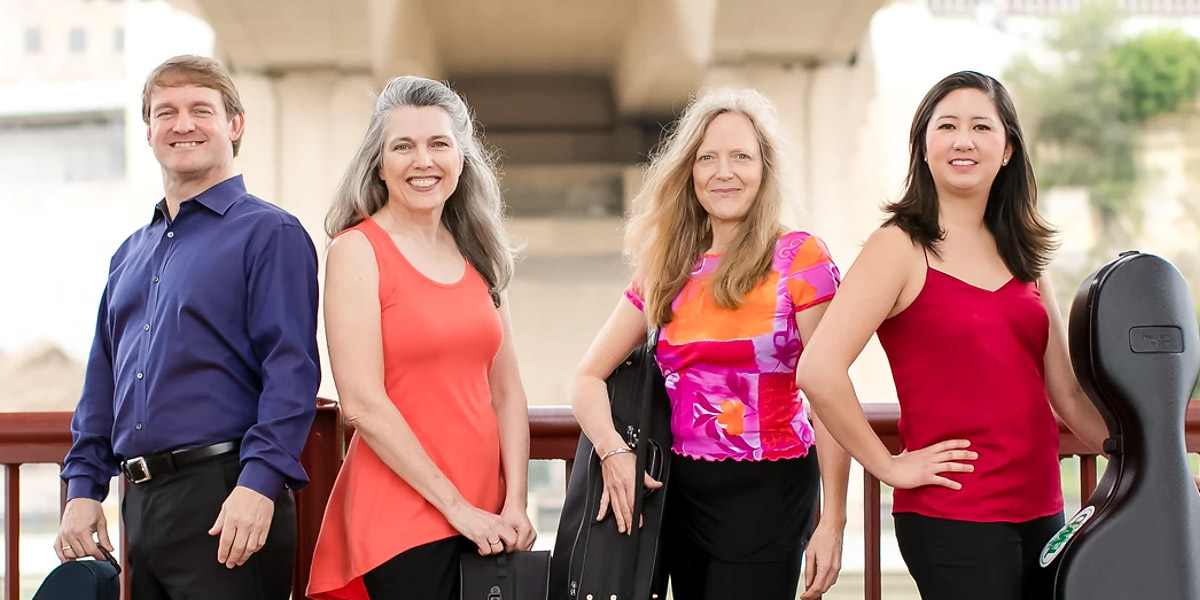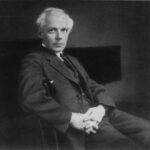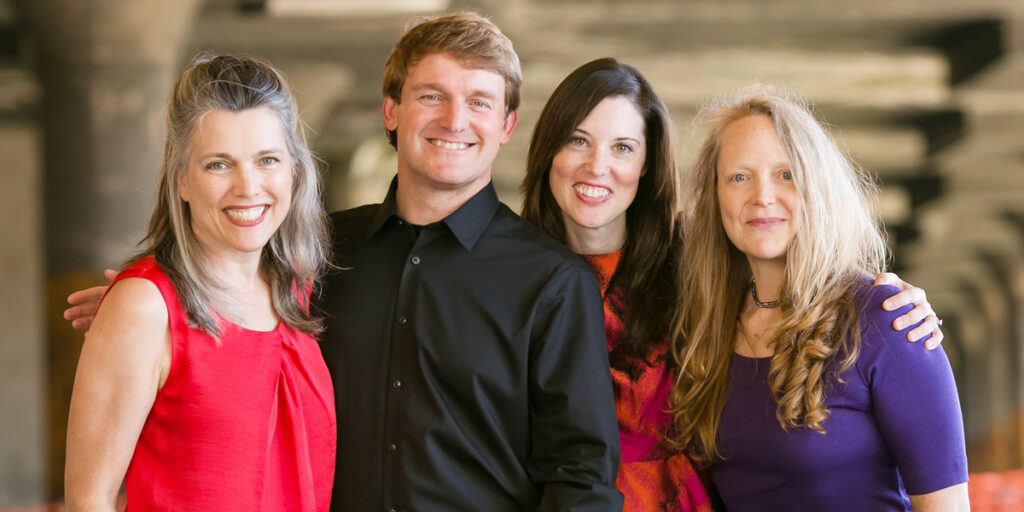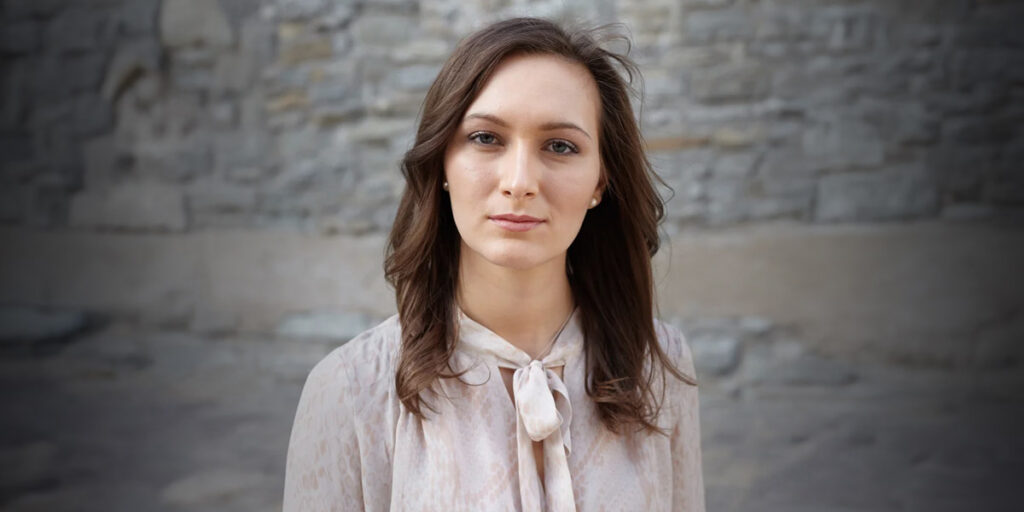

FREE Courtroom Concert: Artaria String Quartet
Thursday, January 4, 12:00PM
Landmark Center Courtroom 317
Artaria String Quartet: Bartók String Quartet Cycle
Hosted by composer Abbie Betinis, our popular Courtroom Concerts take place at noon most Thursdays in the Landmark Center in downtown Saint Paul. This series features accomplished musicians and composers from the Twin Cities and surrounding area, as well as occasional musical newcomers to the area. These one-hour concerts are free and open to the public.
The nationally acclaimed Artaria String Quartet will perform all six of Bartók’s String quartets spread between three concerts in January.
About the Artists:
“Minnesota’s foremost teaching and performing string quartet”, the Artaria String Quartet is an “exceptional ensemble with impressive confidence in its interpretations” Winners of the prestigious 2004 McKnight Fellowship for Performing Musicians, Artaria was featured on Twin Cities Public Television as part of the “Minnesota Originals” series, and were named 2013-14 Minnesota Public Radio Artists-in-Residence. They recently celebrated their thirty-fifth year of chamber music performing and educating. Artaria was formed in Boston, and mentored with venerable members of the Kolisch and Juilliard Quartets. Their “refined and thoughtful playing” brought them to the attention of Alexander Schneider, violinist of the legendary Budapest Quartet, who invited them to make their New York debut on his own New School Concert Series. Since then, they have performed at major venues throughout the United States and Europe, on national television and public radio, and at top international music festivals. In 1992, Artaria competed at the Fourth Banff International String Quartet Competition in Banff, CA. Earning numerous awards from the National Endowment for the Arts, Chamber Music America, and the Minnesota State Arts Board for excellence in performance and educational outreach, Artaria are founders of the highly regarded Artaria Chamber Music School in Saint Paul, MN, Stringwood Summer Chamber Music Festival, in Lanesboro, MN, and the Saint Paul String Quartet Competition, which showcases the nation’s top high school and collegiate string quartets each April.
The Bartók String Quartets

Béla Bartók’s place in musical history is unique since he represents no one school of music. At a time when the German traditions of Haydn, Mozart, Beethoven, Schubert, and Brahms were giving way to the Second Viennese School led by Arnold Schoenberg, Bartók stood alone. While his early music was fed by the Romantic traditions of Brahms and Wagner, it is his own unique exploration of folk music, dissonance, rhythmic vigor and color, and a sense of the spiritual that most govern his important work. In a 1905 letter to his mother, he said knowingly, “I prophesy, I have foreknowledge that this spiritual loneliness is to be my destiny.” Despite that loneliness, he breathed new life into an old system without joining the Serialists who would themselves ultimately suffer a kind of isolation.
With his friend Zoltán Kodály, he compiled a collection of Hungarian folk songs, a project that absorbed him from 1905 to 1921. This exploration was to influence his music greatly, but a word must be said about that. While he ardently espoused Hungarian nationalism, he is also quoted in József Ujfalussy’s 1971 biography as having said, “The composer does not use genuine peasant melodies, but devises instead something imitating a peasant melody.” For Bartók the art lay in complex devising, not simple imitation.
Bartók’s life was not a happy one. Usually outside the mainstream of the European avant-garde of his time, he emigrated to New York in 1940 to become a research fellow at Columbia University working on Serbo-Croatian music. For his last five years, precarious finances, a sense of alienation, and poor health plagued him. Serge Koussevitzky, one of his few champions, went to Bartók’s hospital room to offer a much-needed check for $500, which represented half the commission for the Concerto for Orchestra. Harvard, where he was to deliver a series of lectures but was too ill to do so, and later the American Soci-ety of Composers, Authors and Publishers (ASCAP) sponsored medical examinations for Bartók after his weight sank to 87 pounds. He rallied enough to write the Concerto for Orchestra but, less than a year later, died of leukemia in New York’s West Side Hospital.
Today Bartók’s six string quartets are monuments of the 20th century repertoire. How terrific of the Artaria String Quartet to take them on!
The string quartet spanned Bartók’s works from the first one in 1909 to the sixth and last written in 1939. The second came in 1917, the third in 1927, the fourth in 1928, and the fifth in 1934. As Beethoven’s quartets mark his so-called “periods”, so do Bartók’s quartets divide his compositional life into three periods, the first ending with the 1st quartet, the second with the 4th quartet, and the 5th and 6th quartets belonging to the third period. While the first period contained few references to folk music, the second was rich in them as well as in harmonic and rhythmic experimentation. The third period is a culmination of what came before but in sparer terms, not unlike the late works of Beethoven.
Like other composers, Bartók made his most intimate state-ments in the string quartet form as well as his most serious, inventive, and powerful. Today Bartók’s string quartets are ranked with no less than those of Haydn, Mozart, and Beethoven. In the 20th century, only those of Schoenberg, Berg, Shostakovich and Carter approach Bartók’s.
About the Host:
Abbie Betinis is a nationally recognized composer, writing music called “inventive” (The New York Times), “joyful… incandescent” (Boston Globe) and “beguiling” (BBC Music Magazine). A two-time McKnight Artist Fellow, and recognized by Musical America for her “ability to use her talents to effect social change,” she was adjunct professor of composition at Concordia University for over a decade, and composer-in-residence with the Schubert Club from 2005-2017, connecting and facilitating opportunities in new music. Abbie studied composition at St. Olaf College, the University of Minnesota, and the EAMA Nadia Boulanger Institute in Paris, France. She has hosted the Courtroom Concert Series since 2010.



